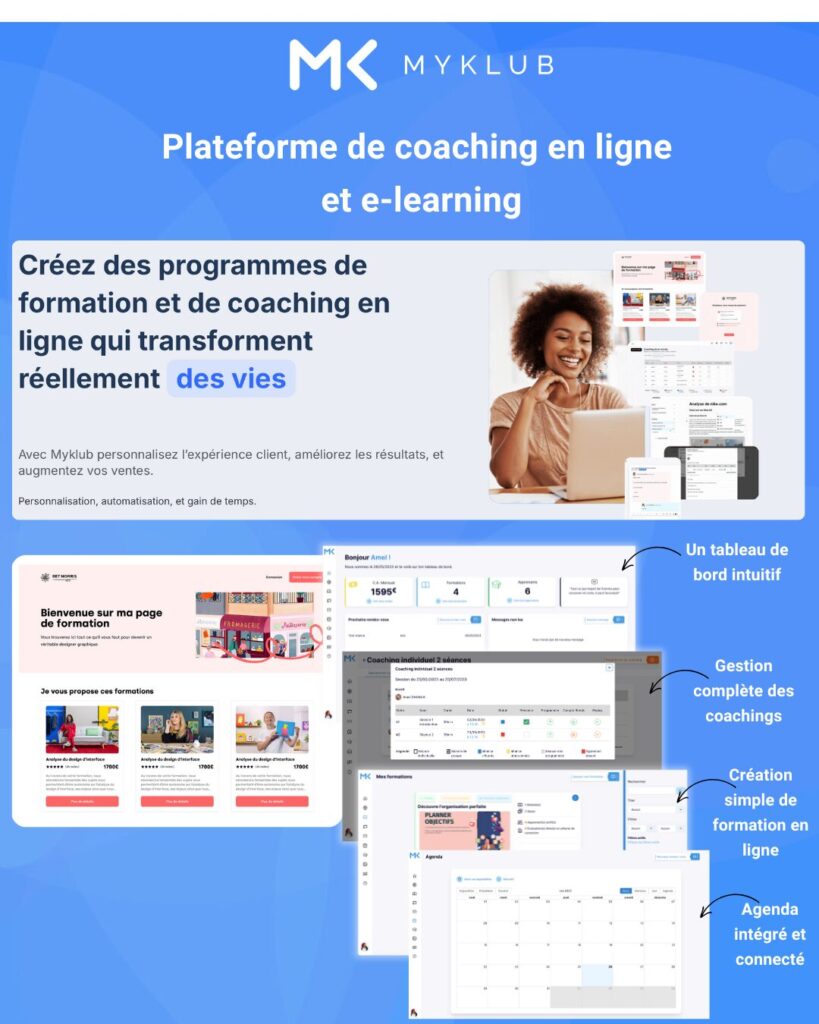With the rise of digital, elearning platforms have become indispensable tools for coaches and trainers looking to expand their audience and offer training remotely. Whether you are a personal development coach, a corporate trainer, or an expert in a specific field, an elearning platform allows you to share your expertise more effectively and on a large scale.
But how do these tools work, and more importantly, how can you use them to maximize your impact and generate stable income? This article will guide you through the benefits of a e-learning platform for trainers and will give you concrete tips to get the most out of these tools.
Definition of an e-learning platform for trainers
A e-learning platform is a digital solution that allows you to create, manage and track your online training programs. Also known as LMS (Learning Management System), it centralizes the entire teaching process: student management, course delivery, progress monitoring, and results evaluation. As a trainer, an e-learning platform like MyKlub gives you the ability to create a complete and interactive experience for your customers.
Essential features for trainers on an e-learning platform
1. Creation of custom content
The best e-learning platforms allow you to design courses based on the needs of your learners. You can offer explainer videos, downloadable PDFs, interactive quizzes, or even practical exercises. This allows you to convey your expertise in a varied and engaging way.
2. Simplified learner management
An LMS helps you manage your participants with one click. You can track their progress, see which lessons have been completed, and identify areas where they are struggling. This centralized management not only makes your job easier, but also improves your customers’ experience.
3. Live sessions and recording of replays
THE live sessions are particularly popular with coaches and trainers. They allow direct interaction with your students, providing a personalized learning experience. Platforms like MyKlub record these sessions, making them available in replay for those who were unable to attend live.
4. Automation of monitoring and reminders
Learner tracking is essential to keep them engaged. E-learning platforms allow you to automate the sending of follow-up emails or reminders, based on your learners’ actions (for example, if they haven’t completed a module). These features help you stay in touch with your learners without any extra effort.
Why an e-learning platform is essential for a coach or trainer
1. Evolve without geographical constraints
One of the biggest advantages of a e-learning platform for a trainer is the ability to reach an international audience without geographical limitations. You can offer your training to clients all over the world, which multiplies your revenue opportunities. With an LMS, it is no longer necessary to limit your sessions to classrooms or physical spaces.
2. Monetizing your knowledge
E-learning platforms allow coaches and trainers to create several types of business models. You can offer:
- Of the on-demand courses (self-paced) for a wider audience.
- Of the live sessions for personalized support.
- Of the subscriptions for long-term access to your training or content.
These options allow you to diversify your revenue streams while providing ongoing value to your customers.
3. Long-term loyalty and support
Another great advantage is the possibility of to retain your learners. By offering regular updates or new modules, you can maintain a connection with them and encourage them to come back for other training courses or for more personalized follow-up. Forums and discussion groups can also promote this loyalty by creating an engaged community around your training courses.

How to get the most out of an e-learning platform as a coach or trainer
1. Choose the right platform for your strategy
Not all platforms are created equal, and it’s crucial to choose the one that fits your needs. Here are some questions to ask yourself before making a choice:
- What types of training will I offer? (webinars, videos, individual coaching)
- What are my goals in terms of number of learners and revenue?
- Do I need specific features like live sessions, payment management, or training completion certificates?
MyKlub, for example, stands out for its ability to manage one-to-one, group training, and online modules, making it a versatile tool for trainers.
2. Optimize your content for maximum engagement
To maximize the impact of your courses, it is essential to make your content interactive and varied. Here are some tips:
- Use some videos : Videos are a great way to explain complex concepts. Make sure they are short and punchy to maintain attention.
- Add some practical exercises and quizzes : These elements allow your learners to test their knowledge and apply what they have learned.
- Include testimonials and case studies : Show how your teachings have helped other clients achieve their goals.
3. Automate and delegate certain tasks
As a coach or trainer, it's easy to feel overwhelmed by the day-to-day running of your business. Fortunately, e-learning platforms automate tasks such as sending certificates, tracking payments, or reminders for inactive learners. These automations save you time while ensuring a better experience for your customers.
4. Use data to improve your training
THE data that you get on an e-learning platform are valuable. As a trainer, you can analyze statistics on your learners' progress, identify the most or least popular modules, and adjust your training accordingly. This allows you to constantly improve the quality of your content and better meet the needs of your audience.
How MyKlub helps coaches and trainers succeed
MyKlub positions itself as an ideal solution for coaches and trainers who want to offer a complete service to their clients. Here are some key features that can transform the way you work:
- Centralized system to manage your sessions, replays, and reports.
- Customer tracking automation to keep your learners engaged.
- Customization options to tailor the platform to your specific needs, such as adding your own branding or managing payments.
With Myklub, you can also benefit from robust technical support and an easy-to-use interface, allowing you to focus on what you do best: passing on your expertise.
Click to discover all the MyKlub features.
Conclusion: Maximize your impact with e-learning platforms
THE e-learning platforms provide an incredible opportunity for trainers and coaches to expand their reach and maximize their impact. By choosing the right platform, structuring your content effectively, and automating certain tasks, you can not only increase your revenue, but also provide a better experience to your clients.
So, are you ready to take your coaching or training business to the next level? Explore the possibilities offered by Myklub. Myklub is uniquely positioned to help you create and sell your High Ticket offers. Our goal: to help you create real transformations for your clients!
Tips for optimizing the use of an e-learning platform
How to choose the e-learning platform that suits your needs
First of all you need to know What are the types of platforms and which one to choose?, then here are our tips for making the customer journey 5 stars.
Tips for maximizing learner engagement on the platform
To get the most out of your e-learning platform, here are some tips:
- Create a learning schedule and set clear, achievable goals.
- Vary the media and activities to avoid boredom and weariness.
- Participate in discussion forums and webinars to enrich your knowledge of your learners' issues.
- If you are wondering how instructional engineering works then check out: Create an online training course in 9 steps: the ultimate guide!



